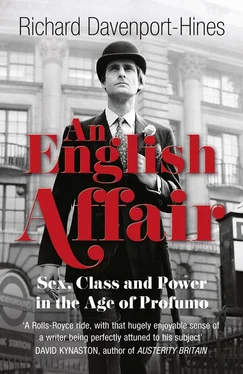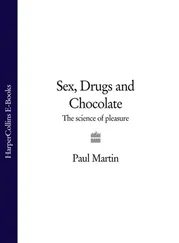I suspect that on that June afternoon it became inevitable that I would write one day about the sexual oppression, guilt and bullying, the whitewashing and blackballing, the lack of irony and absurd confused anger of ‘Jack’ Profumo’s England. The London half-world of Mandy Rice-Davies and Christine Keeler, or rather of their protectors, was the world in which I grew up. My grandparents lived in Bryanston Square, two minutes’ walk from Marble Arch. My mother lived in Montagu Mews West, which lay between Bryanston Square and Montagu Square. On the other side of Bryanston Square lay Bryanston Mews West. It was in a flat there, occupied by the slum landlord Perec Rachman, that the two-way mirror was installed through which steamy voyeurs – perhaps including the osteopath Stephen Ward – watched couples performing on a bed. Ward, the scapegoat of the Profumo Affair, spent the night before his show trial opened at the Old Bailey in a friend’s flat in Montagu Square: tabloid newspapers blared that he slept in blue silk pyjamas with a pink curtain in a gilt frame behind the bed. This, indeed, was soft living. Another block to the south-east was Portman Square, where Paul Raymond of Raymond’s Revuebar bought the penthouse which he shared with the glamour model Fiona Richmond. Ringo Starr, whom Raymond employed as his interior decorator, rewarded him with a panoply of James Bond gadgets and parvenu glitziness.
At the time of her temporary disappearance in March 1963, Christine Keeler lived at Flat 164, Park West, Edgware Road, three minutes’ walk from Bryanston Mews West, and a minute further from Montagu Mews West. For a time my father kept a leggy brunette in a flat in Park West. He took me there once in 1963, bounding up to the front door, which he opened with a flourish of his key chain. I asked him why he had a key to the woman’s flat. ‘I have a key,’ he replied with immense satisfaction, ‘that opens every door in London.’ He meant money. The Edgware Road flat was my induction into sexual deception, duplicitous lives and double standards. I have been standing on tiptoes, trying to peer into secret compartments, ever since.
The irritability of London motoring is a misery that I remember too well. My father bought his first car before driving tests had been devised. His school of motoring was Toad of Toad Hall’s. His spiritual home was the fast lane: he never felt more himself than when he was behind a steering wheel with his foot hard on the accelerator. As a Christmas treat for 1959, just after the M1 motorway had opened, he took me for a quick run north from Watford, which I believe may have turned into a dashing ‘fun-drive’ all the way to Rugby and back. Certainly I recall him saying on the interminable return journey that he would write to the Minister of Transport to complain that trees had been left standing beside the motorway, and might cast dangerous shadows by moonlight. He liked high-velocity travel to lay waste to the landscape.
The speed limit of seventy miles per hour was introduced as a temporary measure in 1965 to cope with enthusiasts like my father. Every few months he would take me to Jack Barclay’s car showroom in Berkeley Square. The salesmen were thin men with thin moustaches, sharp suits and sharper eyes. They stood apart from one another, idling by the polished bonnets and winged mascots, but were swift and implacable as they headed for their prey when a customer stepped inside the plate-glass windows: lone sharks, one might say. Sometimes my father drove a Bentley, sometimes a black Alvis. One thing all his cars had in common was no wing-mirrors. Wing-mirrors, my father often told me, spoilt the line of a car. They were effeminate. A good driver, a real man, did not need to look behind him. This creed led to several accidents, many altercations and, for me, one Copernican moment of political revelation.
On a Saturday during the summer after Miss Groom sent me to be beaten, and Mr Wilcox denounced the sadism of James Bond, and Mrs Soskin deplored the breakdown of Public Morals, my father sped me to Park Lane. It was August 1964, and we were in a black Alvis with the hood down. A year earlier workmen had finished converting the sedate old carriage road of Park Lane into a dual carriageway with four lanes on both sides. Old avenues of trees were felled, the eastern meadows of Hyde Park put under macadamised tar, and concrete burrows were excavated so that Mayfair businessmen could park their Jaguars in strip-lit subterranean hideaways. Thinking of Hollywood rather than Paris, Whitehall officials had wanted to foist the name of Park Lane Boulevard as a cosmetic to cover the scars of their vandalism. My father loved the swift new Park Lane as a reminder that England was finished with slowcoaches.
There were other signs of change. Sir Philip Sassoon’s great house overlooking the park had lately been torn down, and replaced by a monstrosity that housed the Playboy Club. The developer of the site, Jack Cotton, who lived on Park Lane himself, had, in a show of braggadocio, paid Walter Gropius, the Bauhaus architect, to advise on the redevelopment. Gropius’s inspiration, with which London was learning to live, was to assert the unyielding modernity of the new building by cladding it in concrete rather than the original plan of Portland stone.
We stopped at the Hilton hotel. Its thirty storeys and jutting gimcrack modernity had been opposed at planning stage by ‘stick-in-the-muds’ whom my father had rejoiced to see quashed. The hotel towered over the rest of Park Lane, and could be seen in its unwieldy disproportions from the far end of Kensington Gardens. It was the first building in London to overlook the gardens of Buckingham Palace, and this objection, too, had been quelled to my father’s pleasure. (Thirty years later I was to read the minutes of the Cabinet meeting at which Harold Macmillan’s government endorsed this encroachment on the Queen’s privacy: the justification given was that American holiday-trippers staying in the Hilton would bring badly needed dollars to revitalise the ailing English economy.) The site had belonged until 1956 to an old banking family, the Abel-Smiths, who had a mortgage on it. This was a period when debt frightened most people as a weir would scare steady ferrymen, but spurred a bold minority rather as the wide oceans excited fearless privateers. The Abel-Smiths had therefore sold their plot for £550,000 to a property developer called Charles Clore, who bedded Keeler, as it happens. Clore, who borrowed heavily, spent another £5 million turning the site into the Hilton. In the hotel my father and I went to the American coffee shop: he gulped scalding black coffee while I spooned my way through a banana split or knickerbocker glory. I cannot imagine why we were there: perhaps a rival for the brunette was in the offing.
Afterwards, back on wheels, the Hilton behind us, my father stopped his car outside a large, abandoned house of dilapidated stucco on the corner of Hertford Street and Old Park Lane. It was awaiting demolition, he explained. Londonderry House, he added, had belonged to a proud, stupid family who had been friends of Hitler, but the last lord had been a helpless drunk who had died young. Now their day was done, the old house where prime ministers once dawdled on the marble stairs had been sold and was to be torn down. Londonderry House would be smashed for good. It represented a world that impeded progress. My father told me that another hotel for Americans was planned for this site next to the Hilton. It was glorious what competition was going to do. It was marvellous what future prosperity was promised to those who were quick to snatch their chances.
Then my father swung the car round into a full U-turn to head back to Park Lane: no unmanly glances back over the shoulder, no effeminate wing-mirrors to look in, just my father’s iron resolve as he pulled out. There followed an almighty screech of brakes, a squeal of tyres, and the sound of a horn held down hard. A black taxi cab behind us had made an emergency halt. As we completed the U-turn and passed the stationary taxi, my father stopped, looked at its driver and gave a harsh, defiant laugh: he was proud of having a chuckle that made people lose their temper or, if they were already angry, re-double their rage. The taxi driver was furious, temporarily powerless, but not, he reminded us, permanently disempowered. As my father drove off chortling, his victim shouted after him the deadly threat: ‘Wait until October!’
Читать дальше












